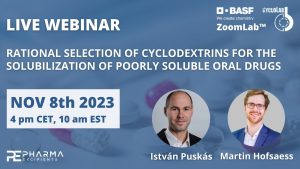Leveraging the use of in vitro and computational methods to support the development of enabling oral drug products: An InPharma commentary

Abstract
Due to the strong tendency towards poorly soluble drugs in modern development pipelines, enabling drug formulations such as amorphous solid dispersions, cyclodextrins, co-crystals and lipid-based formulations are frequently applied to solubilize or generate supersaturation in gastrointestinal fluids, thus enhancing oral drug absorption. Although many innovative in vitro and in silico tools have been introduced in recent years to aid development of enabling formulations, significant knowledge gaps still exist with respect to how best to implement them. As a result, the development strategy for enabling formulations varies considerably within the industry and many elements of empiricism remain. The InPharma network aims to advance a mechanistic, animal-free approach to the assessment of drug developability. This commentary focuses current status and next steps that will be taken in InPharma to identify and fully utilize ‘best practice’ in vitro and in silico tools for use in physiologically based biopharmaceutic models.
Introduction
The pharmaceutical development process of developing molecules into medicines is wrestling with considerable changes. The drivers of change include the need for continuous innovation in the emerging healthcare landscape, such as enabling technologies for increasingly complex drug discovery pipelines. In addition, some of the drivers of change reflect the evolving societal needs such as more affordable medicines or a need for more ethical pharmaceutical development including environmental sustainability or reducing animal testing. These complex and multifactorial challenges necessitate public–private partnerships that foster collaboration. The InPharma network is an EU Horizon 2020 funded European Industrial Doctorate programme that brings together multiple industrial and academic partners, with a collective goal of developing a fully integrated, animal-free, end-to-end model-based approach to oral drug development.
Download the full article as PDF here Leveraging the use of in vitro and computational methods to support the development of enabling oral drug products: An InPharma commentary
or read it here
Christos Reppas, Martin Kuentz, Annette Bauer-Brandl, Sara Carlert, André Dallmann, Shirin Dietrich, Jennifer Dressman, Lotte Ejskjaer, Sebastian Frechen, Matteo Guidetti, René Holm, Florentin Lukas Holzem, Εva Karlsson, Edmund Kostewicz, Shaida Panbachi, Felix Paulus, Malte Bøgh Senniksen, Cordula Stillhart, David B. Turner, Maria Vertzoni, Paul Vrenken, Laurin Zöller, Brendan T. Griffin, Patrick J. O’Dwyer, Leveraging the use of in vitro and computational methods to support the development of enabling oral drug products: An InPharma commentary, European Journal of Pharmaceutical Sciences, Volume 188, 2023, 106505, ISSN 0928-0987, https://doi.org/10.1016/j.ejps.2023.106505.
Read more on “Rational Selection of Cyclodextrins for the Solubilization of Poorly Soluble Oral Drugs” here:


